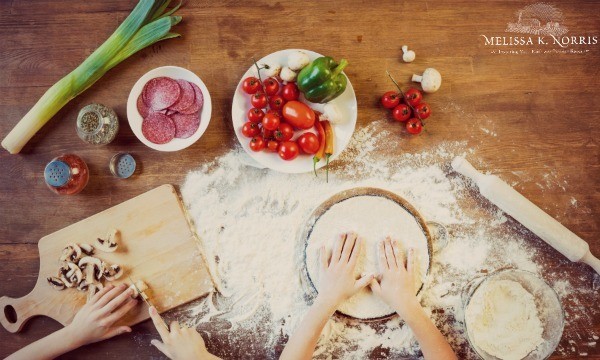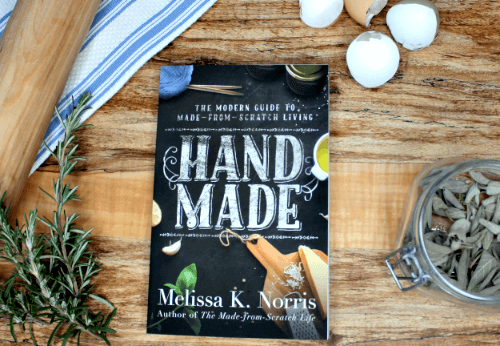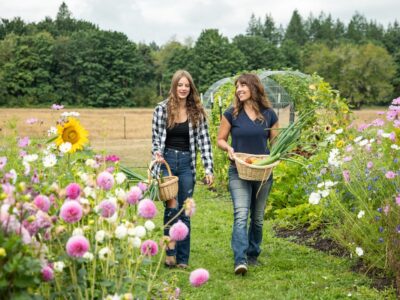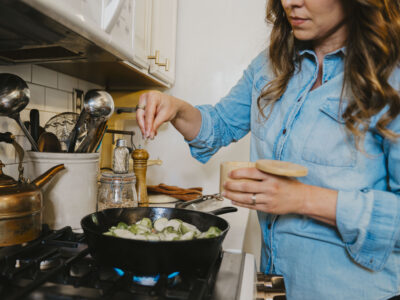No matter where you’re at on your home setting or self-sufficiency journey, the kitchen is the heart of everything. Because we’ve all got a kitchen, and we all need to eat every single day.
But it’s an area that can oftentimes cause a lot of stress. You wouldn’t think so, but for me, meal time and just making sure that everything is done and that we’re eating the foods that we want to (aka from scratch real food), can sometimes cause a little bit more stress than it should. Tell me it isn’t just me?
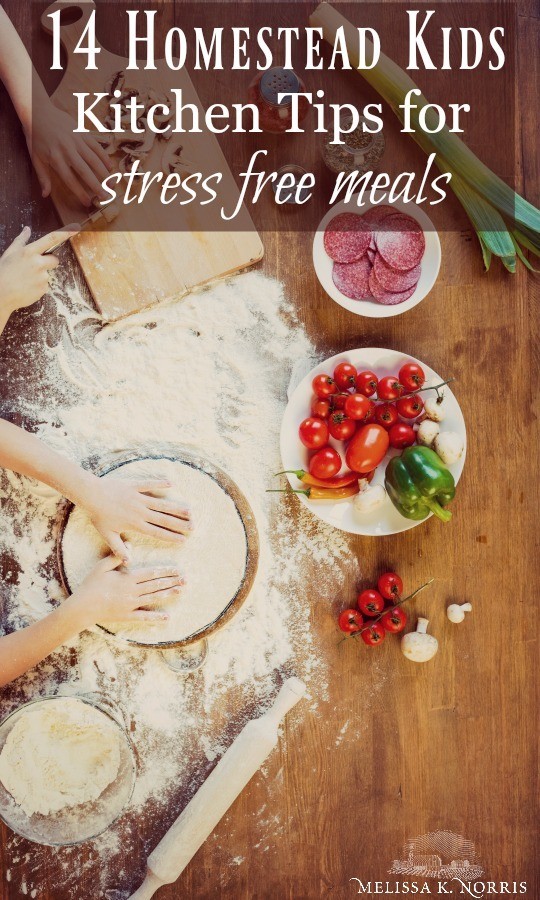
🍞 Struggling With Sourdough?
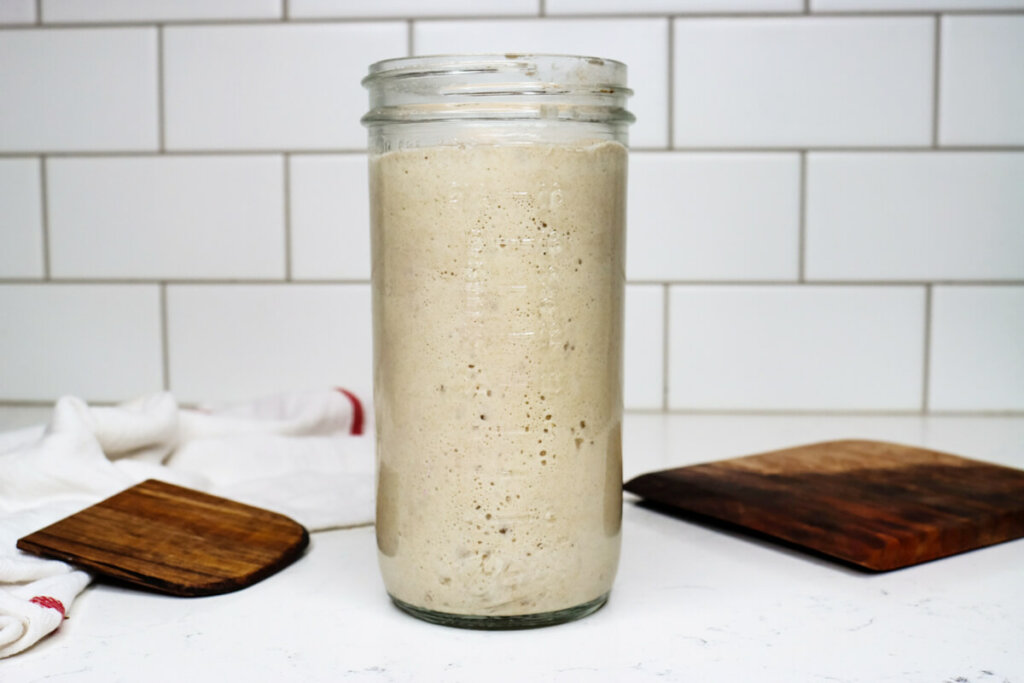
If your starter won’t take off, your loaves are dense and hard, or sourdough just flat-out overwhelms you…
👉 I’ll show you how to fix all of it.
Join my FREE workshop and learn how to make a bubbly, active starter—the right way, from Day One.
I’ve got a special guest on the podcast today, Katie Kimball of Kitchen Stewardship, because I’ve been slacking in one area of our homestead kitchen… specifically, teaching my kids… and allowing them… to cook.
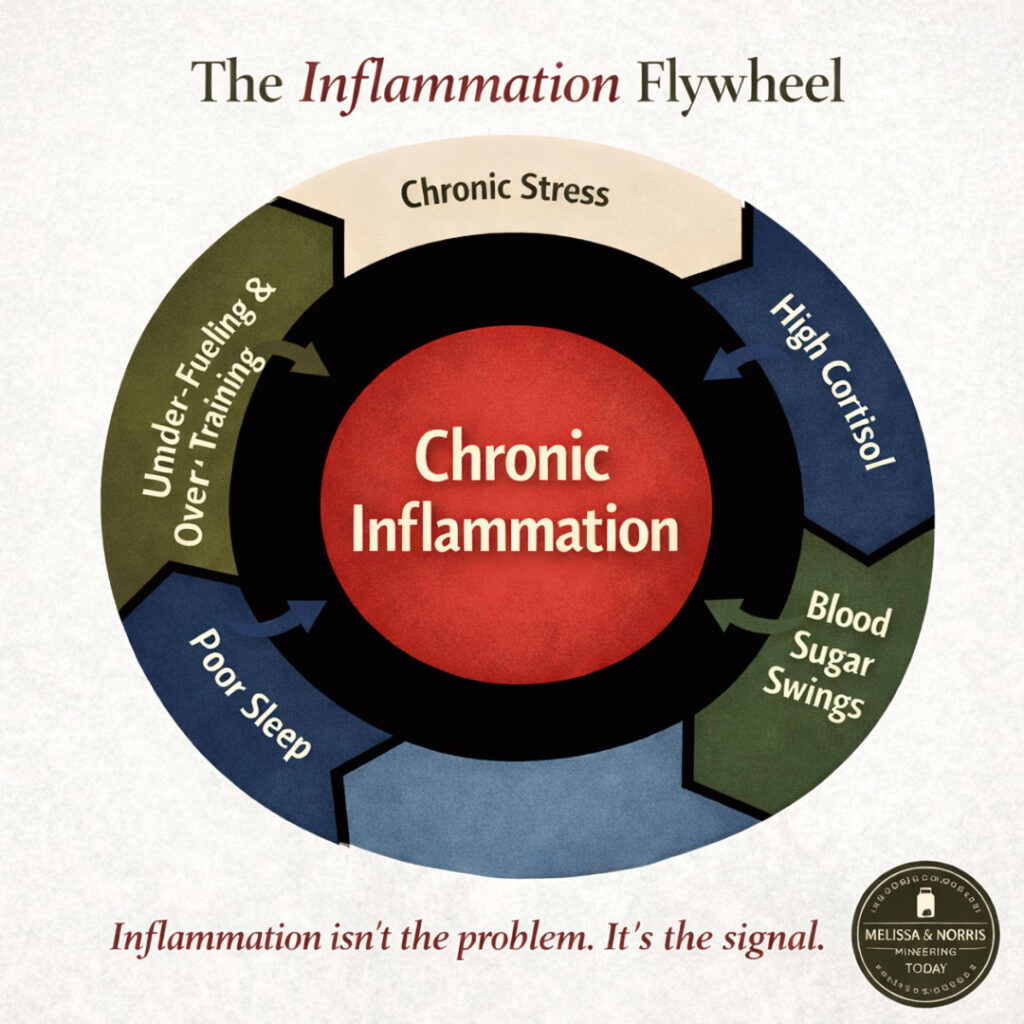
The Hidden Cycle Keeping You Inflamed
If you’ve been feeling puffy, tired, achy, or wired-but-tired, this two-page guide will help you understand what may be happening behind the scenes — even if you’re eating “healthy.”
Download the Inflammation Flywheel Guide and learn:
- Where to start so you don’t feel overwhelmed
- The 5 most common drivers that keep inflammation switched on
- Why blood sugar swings, stress, and poor sleep feed each other
We will always be seeing people say, “man, I was never taught to cook. I don’t know how to be healthy”, unless, we back up to the next generation.
Listen below to Episode #141 of the Pioneering Today Podcast,where we teach families how to grow, preserve and cook their own food using old-fashioned skill sets and wisdom to create a natural self-sufficient home, with, or without, the homestead.
Melissa: I was blessed with a Mom who cooked pretty much everything from scratch. Part of it was due to necessity, we couldn’t afford to eat out or buy packaged convenience food, but the other part was she enjoyed baking and cooking.
She taught me how to do a few recipes, but I didn’t cook whole meals or a lot. I got married when I turned eighteen and I kid you not, I called my mom every single night to ask her one question or another about a recipe, or a specific way to do something because I had seen her do it. There were a lot of little nuances that I didn’t realize I didn’t know until I would set out to make the recipe.
Confessions of a Homestead Mom in the Kitchen
This is kind of an area, I will be honest, I struggle with because time is of the essence. This is going to sound so bad, but it’s so true. I know I can cook the meal, keep the kitchen a lot cleaner, and everything is more streamlined.
If I just do it, then I know it gets done, I sound like a control freak, but I know that it gets done the way that I want it to. It doesn’t take me any extra time, and it does take more time when you’re teaching somebody.
My son just turned 13. My daughter will be 9. They need to learn more skills in the kitchen, and I kind of feel guilty, because it’s my fault that they don’t have more skill sets.
For somebody like me, who has not really given them a ton of skills, I’ve kind of micro-managed them a lot, in the kitchen, walk me through some of the steps to take to get them to start doing more things, and to make them feel confident in their abilities in doing it.
How to Get Your Kids Helping in the Kitchen
Katie: 1.First of all, we’ve got to buy into it. You know, it’s so easy for us moms to have this mom guilt and be kind of self deprecating like, oh, I sound like a control freak, and oh, this is so bad. You are so not alone though, Melissa. Every mom out there is saying, “This is my space. I am faster. I am less messy.”
Nobody really wants to have their kids in the kitchen. We know academically, this is a good idea. This would be good parenting. In our hearts, we’re like, get out. So many things in life are like that. We know that if we would invest a little time up front, it would be easier later, but we just can’t get around to it.
2. It will pay off. What I hear from members in our course, though, is that after just one or two lessons, it starts paying back. You start to literally get a return on investment right away, because when the kids have, and again this is not for the three year olds. But for even seven years old and up, when they have some skills in the kitchen, they can be prepping your raw veggies, or your salad veggies while you’re prepping dinner, or vice versa.
We’ve got moms that say, “Well I had to go nurse the baby, and my kids could finish up dinner. It was like a miracle.” It doesn’t have to be a miracle. It’s just building some basic skills.
3. Focus on skills and not recipes, because I don’t want kids to know I know how to make five recipes. I want them to have skills where they can tackle any recipe, like you were saying you were constantly calling your mom. That’s what we want to empower them with now.
4. Get them doing it. It seems silly to have to talk about it, but you know it’s not. You know most moms are like, “Yeah, okay whatever. Whatever she tells me, I’m not going to take the time.” So I have to get people to believe it really will pay back.
Even my four-year-old when he was, he’s six now, but when he was four, he could mix up. We make homemade ranch dressing mix, and taco seasoning, and stuff. Using our methods, he could literally mix those up. It might take him 45 minutes, but it’s hands off for me once I get it set up. It still ultimately saves time.
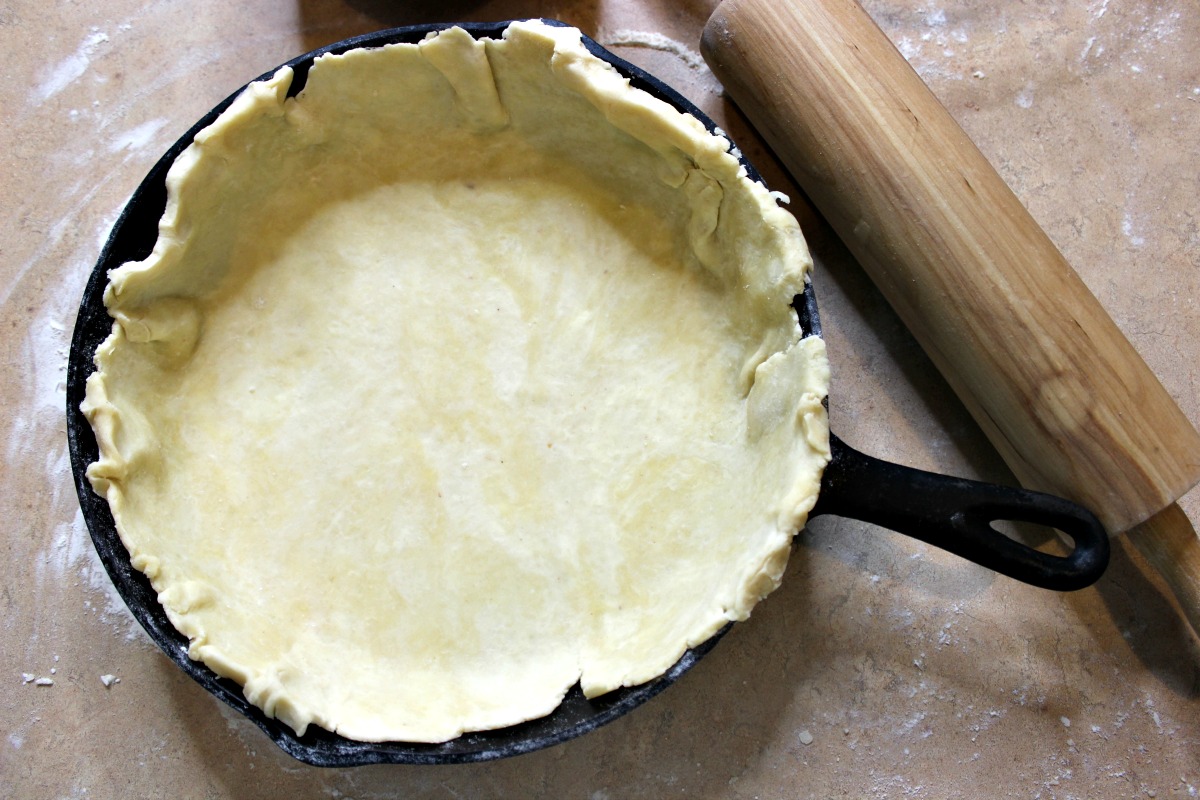
Believe that ultimately it will save time with a little bit of investment.
Kitchen Skills to Teach Kids by Their Age
Then, getting them in the kitchen. Focusing on skills is really important.
Kids age 2 to 3-years-old. We start kids at age two and three with a butter knife, cutting soft things, because we want them to have good habits with the butter knife. We actually teach them:
- appropriate holding patterns
- techniques
- knife skills
Then we can feel comfortable giving them a sharper knife, knowing they actually won’t cut their fingers off, and this is a good thing.
Elementary aged children. Teach them:
- How to read a recipe from beginning to end
- How to put ingredients to the left and as you use them, place them to the right, so you never wonder if you’ve put something in or double up.
Kids Age 6 to 7-years-old. Teach them:
- Stove safety. We move those kids to the stove and talk about stove safety and proper stirring so you’re not sloshing it all over.
- How to brown meat
Older kids:
- Chef’s knife skills because, again, I swear 40 to 60% of your time in the kitchen probably is at the cutting board. When you’re cooking with real food, you can’t help but be cutting up the produce all the time.
Really focusing on those skills and not being afraid to give a little bit to the kids, give a little bit of responsibility, making sure that we don’t ever let them get bad habits. Even when it’s a butter knife and a banana, I’m still going to train them, rather than … You know what I mean. It’d be kind of easy to give a three-year-old like, here honey. Why don’t you try this? This will be so fun and cute, and then just let them figure it out.
It’s important to show them how to do it, because if they’re figuring it out, there is no consequence with the butter knife. They could do it wrong and they’re not going to hurt themselves.
Melissa: The first year I was married, in 1999 (we didn’t have a computer in the house, no Pinterest, or even googling how to do or cook something) I would call my mom every night with some type of question on cooking or house keeping.
I would call her with those type of questions that now, if you have some good cook books (not so shameless plug, if you don’t have my book Hand Made, you need to get it, there’s charts with temperature and times for cooking a turkey by weight because I can’t be the only one who never remembers how long by the size, and over 100+ from scratch recipes) then you’ve got a lot of that information in there. Those are kind of some basic skills that we don’t necessarily learn. It doesn’t happen osmosis.
Even adults who are learning how to cook from scratch, transitioning away from processed convenience foods will benefit from learning good basic kitchen skills.
What are some of the next skill sets that you start to build up on once they’ve got knife skills down
Katie: Before we leave knives, I just want to make sure your listeners know that at KidsCookRealFood.com/Pioneering. It’s about 10 minutes long. It’s for all ages.
We use a lot of mnemonic phrases, and just fun little ways to tell kids how to hold the knife and how to hold the food. And that way, if the parents and the kids all have the same vocabulary about it, it’s really easy to even call across the room and say, “Oh, honey, use a saw blade on that tomato. That’ll work much better. You’re smooshing it.”
Go and get the free knife skills class at–> KidsCookRealFood.com/Pioneering
I love that you say that adults need this too because I do have a lot of moms who kind of like under their breath are like, “Don’t tell, but I’m totally learning along with my kids.”
We teach really simple things like:
- different ways of stirring
- how to look for a uniform mixture, because you can really torpedo a recipe if you don’t stir things well. It seems simple, but it’s important.
- appropriate measuring skills- watching for no holes, no hills is one of our phrases, and that’s for both teaspoons and cups.
- Different ways of measuring a fat, versus a flour, versus a liquid, and all with our little mnemonic phrases for each one.
Obviously little kids aren’t going to learn quite as much, right? But we do a really good job, I think, of bring it down to their level.
We have some picture phrases, and special ways of teaching tiny, little kids who can’t even read yet, so that they’re empowered to make recipes like homemade taco seasoning without help because we use these picture images.
At our middle level, so elementary kids, kids who can read, class one is reading a recipe well. Because, again, so many adults glance around. They glance at the recipe and they jump right in, and that’s where you’re going to forget an ingredient, or put something in too early, and then you’re like, “Oh, shoot, I can’t take that out. I didn’t read ahead.”
A lot of adults mess up recipes simply because they’re not doing a process properly. We teach the kids to read all the way through, ask their parents any questions if they don’t understand a word or an instruction.
We talk about getting all the ingredients out, and putting them to the left of your work space, and then moving each one to the right after you use it so you don’t get distracted and put something in twice, right?
Because that’s another way you can totally mess up your recipe, even those of us who know how to cook. That was something my mom taught me when I was little, that organization. So I’m really trying to impart that idea that when you’re in the kitchen you can have a lot of fun, but if you can have a system so that you’re in control, you’re going to have more success with your recipes.
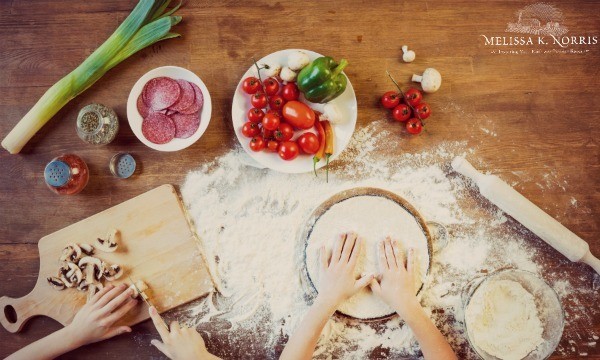
Creating a Plan for Kids to Prepare a Whole Meal
Melissa: My thought is to put them in charge of cooking one meal a week, and they can pick out the food, and then I’ll oversee them in the beginning. But to kind of transition that way, they will be responsible for one thing a week to begin with.
Katie: I think that’s a great idea for summer to put them in charge of a meal for sure. You might want to start the first week or two just by focusing on skills, because starting with a whole meal, even for a thirteen-year-old, is pretty daunting if he hasn’t already done something with the cutting board, and the knife, and the stove and all that stuff. So we, in our class at least, we really try to build one skill on the next.
When I have my kids make a whole meal, if it’s not something that they’ve done before at least once if not twice with me, we’ll sit down, and we’ll read through the recipe together, maybe days before, and talk about:
- what will you need?
- What do we need to buy?
- What do we have in the house?
- Where is it in the house?
- How long do we think it will take, and then we add an extra half an hour.
- Here is the time you’ll start. We write that down maybe at the top of the recipe or on the calendar.
This is when you would need to come home from being out with friends or whatever so that it’s all … They know what they’re doing, and then on that day, they can just jump in, and there is a little bit less pressure, I guess, or confusion
Research just came out, it’s almost funny because it’s common sense.
We did a whole research study and found that with young adults the higher their perception and their own cooking skills, the healthier they eat.
It’s completely the right thing to build that foundation when they’re young before they’re out of your house and out of your control. And then to give you another gem of hope, we totally did the prepping that Saturday.
I grabbed my 12-year-old and my nine-year-old, and we spent little over an hour, actually. But we had so many vegetables tilled and cut by the end.
How to Minimize Stress in the Kitchen When Teaching Kids
Katie: One big stress with families is just elbow room. Whether you have a small or a big kitchen, once you get more and more people in there, they run into each and that tend to drive the adults crazy.
I really recommend to get especially the shorter children at the table, which is just a relief to the kitchen, and the congestion in there. So we put the smallest children on their knees on a chair so that they can see what they’re doing, and then the medium sized children can stand at the table, and it’s counter height for them, which is safer anyway if they’re peeling, or cutting, or whatever they don’t want to be … Imagine working at corner that’s your chest height. That’s not … That’s just not appropriate or economic.
For all those moms who are just, “I can’t handle the chaos. I really, really want my quiet time as I am in the kitchen.” I would say just invite one child in. So you might say something like, I have a space for one sous chef today. Who would like to help? And other people can help tomorrow.
And as well as when you are teaching a skill, this is really, really important.
Never teach a skill right before dinner because there is a time pressure. You want to get diner on the table and everyone is hungry, and those two things are both evil recipes for disaster. It’s not going to be a positive experience most likely.
Think about when you’re not time pressured, and they’re pretty pleasant people to run around usually when they’re fed. So, you actually want to cook in advance for dinner, like prep in advance for dinner during the afternoon or the morning, and when they’re learning a new skill. Then once they know it, they can actually cook dinner.
How to Keep Older Kids Motivated with Cooking
I find it it’s a really a chance for genuine self esteem building if they can feed someone outside your family. If you have a pot luck you’re going to, or you can invite some people over for dinner, even sharing on social media, and letting them see the likes and the comments makes them understand that they’ve done something real.
They’ve done something genuine, they can watch people eating their food, and they just get this little proud smile on their face. You don’t even have to say anything. Obviously, words are good too, but it’s pretty awesome in this world where we say good job about everything. But when people are actually enjoying their food, they know they have done a good job without words even being needed.
